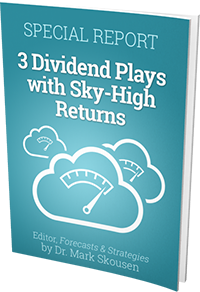I have outlined some basics about advantages, disadvantages and risks of income investing in few of my previous articles on stockinvestor.com.
Now that I covered those basics, I will discuss actual investing vehicles and specific tactics in upcoming articles, starting with dividends.
Generally, any distribution of an organization’s assets to its owners can be referred to as a “dividend.” However, we are interested in a specific type of dividend for retirement income investing. Some examples of what are termed ‘dividends’ may be premiums not used to pay insurance claims each year can be returned to insurance policy holders of a mutual insurance company as “dividends.” Also, any net earnings of an S-Corporation that are distributed to shareholders each year are accurately referred to as “S-Corp dividends” while distributions of excess cash value of a life insurance policy are also referred to as ‘dividends’.
However, these and several other forms of “dividends” are of no interest to an income investor. Depending on the application, the term “dividend” has multiple meanings, and needs to be defined for pure income investors as a subset of the large dividend universe. For income investing, we will define a dividend as a specific type of asset distribution.
Definition
“A dividend is a distribution from an exchange-traded company, partnership, trust or mutual fund that is the direct result of operations and which is sustainable indefinitely or for a specified period.”
As income investors, we are interested in recurring dividends from business entities and securities such as mutual funds. These dividends can be distributions from a C-corporation, a limited liability company (LLC), a real estate investment trust (REIT), a royalty trust, a utility or a business development company, as well as a mutual fund, irrespective of whether it is an open-end fund, a closed-end fund or an exchange traded fund (ETF).
What about master limited partnerships (MLPs)? As their name implies, MLPs are partnerships, not corporations. As such, MLPs technically pay ‘distributions’ instead of dividends. How about bonds, certificates of deposit (CDs), money market funds and exchange-traded debt? All these investment types produce interest and we should call them interest.
Nevertheless, for the purposes of this article and all following articles in this series, I will generally refer to all such distributions as dividends for ease of understanding, regardless of whether they are partnership distributions or interest distributed as “dividends.”
Dividends may be elective, as is the case with C-corporations, MLPs and LLCs. However, with mutual funds, REITs or business development companies, dividends may be mandatory by securities laws. Also, the dividend may be promissory by the company. This is the case with preferred stock, royalty trusts and exchange-traded debt.
Distribution
Dividends are almost always paid in cash. However, although it is rare, you can find a company that will pay their dividend in company shares of stock. Since these dividend distributions are technically what is called a stock splits, they are not treated as taxable distributions by the Internal Revenue Service (IRS). Instead, the shareholder simply has more shares, each of which is usually paid the same amount per share, but with more shares will receive a larger dividend.
Property dividends are even rarer than stock dividends. A company will pay a property dividend when the company wants to keep its cash and not dilute its stock by issuing it as a dividend. So, instead of cash or shares of stock, the company will distribute to its shareholders what it manufactures, such as beer or shoes.
In the past, shareholders might have received a pair of shoes as their annual dividend from a shoe manufacturer. Most income investors will avoid such a stock or property dividend distribution arrangement, as the shares or received property must be sold to receive the actual cash the retiree requires.
Most companies and equities will pay their dividends quarterly. Some stocks will pay dividends semi-annually, as is often the case with European stocks. Other companies will pay dividends monthly, which is generally done to attract those who require the income monthly.
The monthly dividend might be a good sign of the company being responsive to the income needs of its shareholder base or it may be an allure for unsophisticated investors to a poor income investment. Some mutual funds will pay dividends only once per year. However, most of the time, this will not meet the household cash flow requirement of most retirees.
In my next article, I will discuss the important dates every dividend investor needs to know.

Bruce Miller is a certified financial planner (CFP) who also is the author of Retirement Investing for INCOME ONLY: How to invest for reliable income in Retirement ONLY from Dividends and IRA Quick Reference Guide.




